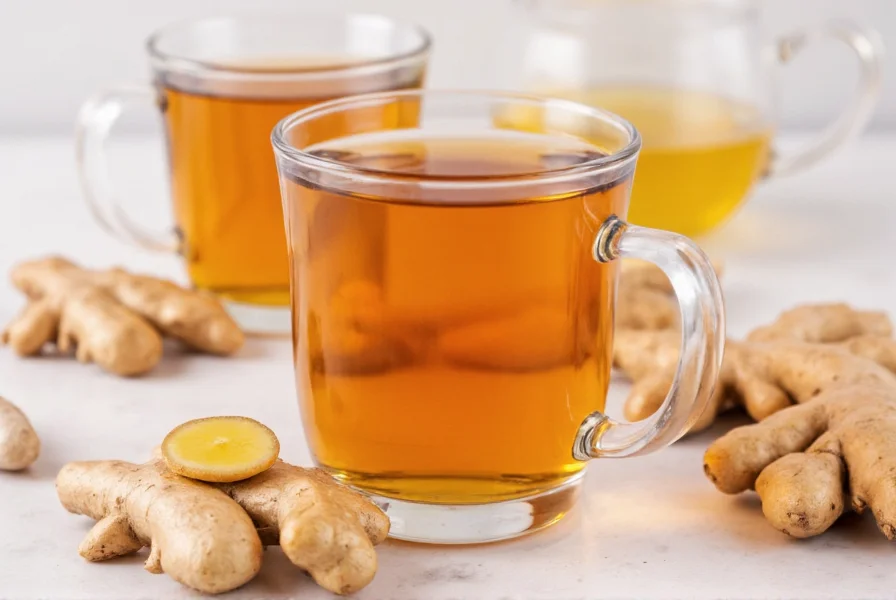When that familiar queasy feeling hits, many people reach for ginger tea as a natural remedy. This time-honored solution has gained scientific backing for its effectiveness in addressing mild digestive discomfort. Let's explore why ginger tea works, how to prepare it properly, and when it's appropriate to use this natural remedy.
The Science Behind Ginger Tea for Digestive Relief
Ginger contains powerful bioactive compounds, primarily gingerols and shogaols, which interact with your digestive system in several beneficial ways. These compounds help accelerate gastric emptying, reduce inflammation in the gastrointestinal tract, and block serotonin receptors that trigger nausea.
A comprehensive review published in the Journal of Gastroenterology and Hepatology analyzed multiple clinical trials and concluded that ginger demonstrates significant efficacy in reducing nausea and vomiting across various conditions. The researchers noted that ginger's mechanism differs from conventional anti-nausea medications, making it a valuable complementary approach for mild digestive issues.
How to Prepare Effective Ginger Tea for Upset Stomach
Not all ginger teas deliver the same therapeutic benefits. The preparation method significantly impacts the concentration of active compounds:
| Preparation Method | Ginger Amount | Water Temperature | Steeping Time | Effectiveness Rating |
|---|---|---|---|---|
| Fresh ginger slices | 1-2 inches (15-30g) | Just boiled | 10-15 minutes | ★★★★★ |
| Dried ginger powder | 1/2 teaspoon (1-2g) | Just boiled | 7-10 minutes | ★★★★☆ |
| Commercial tea bags | 1 standard bag | Just boiled | 5-7 minutes | ★★★☆☆ |
For optimal results when experiencing an upset stomach, use fresh ginger root. Peel and thinly slice approximately one inch of ginger, then simmer in one cup of water for 10-15 minutes. This extended simmering time extracts more gingerols than simple steeping. Adding a squeeze of lemon can enhance absorption of the active compounds, while a small amount of honey may provide additional soothing properties.

How Ginger Tea Works for Different Types of Upset Stomach
Ginger tea's effectiveness varies depending on the cause of your digestive discomfort:
- Indigestion after eating: Ginger stimulates digestive enzymes and helps move food through your system more efficiently
- Nausea from motion sickness: Ginger blocks neurotransmitters that trigger the nausea response
- Morning sickness: Multiple studies show ginger reduces pregnancy-related nausea (consult your doctor first)
- Post-operative nausea: Hospitals sometimes use ginger as a complementary treatment
Research published in Nutrition Reviews indicates that ginger appears most effective for nausea related to motion sickness, pregnancy, and chemotherapy, with moderate effectiveness for general indigestion. The study noted that effects typically begin within 30 minutes of consumption, with maximum benefits occurring around 60-90 minutes after drinking properly prepared ginger tea.
When Ginger Tea Isn't Enough: Knowing Your Limits
While ginger tea offers relief for mild digestive issues, it's crucial to recognize when professional medical attention is necessary. Ginger tea for upset stomach works best for temporary, mild discomfort rather than serious conditions.
You should consult a healthcare provider if you experience:
- Persistent symptoms lasting more than 48 hours
- Severe abdominal pain or cramping
- Blood in vomit or stool
- Symptoms accompanied by fever or dehydration
- Recurring digestive issues that require frequent ginger tea use
Certain populations should exercise caution with ginger tea. People taking blood thinners, those with gallstones, and individuals scheduled for surgery should consult their doctor before using ginger therapeutically. Pregnant women should limit consumption to no more than 1 gram of ginger daily (approximately one cup of strong tea) after consulting with their healthcare provider.
Comparing Ginger Tea to Other Remedies
Many people wonder how natural remedies like ginger tea compare to over-the-counter medications for upset stomach. While products like Pepto-Bismol or Dramamine work through different mechanisms, ginger offers a gentler approach with fewer potential side effects.
A clinical trial comparing ginger to conventional anti-nausea medication found that while pharmaceutical options worked slightly faster, ginger provided more sustained relief with significantly fewer side effects like drowsiness. The study concluded that for mild to moderate nausea, ginger represents an excellent first-line natural remedy.
Maximizing the Benefits of Ginger Tea
To get the most relief from ginger tea for upset stomach, consider these evidence-based tips:
- Drink ginger tea before symptoms become severe for preventative effects
- Sip slowly rather than drinking the entire cup at once
- Use freshly grated ginger for maximum potency of active compounds
- Avoid adding dairy, which may worsen some types of digestive discomfort
- Combine with deep breathing exercises to enhance the calming effect
For those experiencing frequent digestive issues, incorporating ginger tea into your regular routine may help build digestive resilience. However, recurring stomach problems often indicate underlying issues that require professional evaluation rather than home remedies alone.
Frequently Asked Questions
How quickly does ginger tea work for an upset stomach?
Most people experience relief from mild nausea and digestive discomfort within 30-60 minutes after drinking properly prepared ginger tea. The active compounds begin working as soon as they enter your system, with maximum effects typically occurring around 90 minutes after consumption. For best results, sip the tea slowly rather than drinking it all at once.
How much ginger tea should I drink for an upset stomach?
For acute upset stomach, one cup (8 ounces) of strong ginger tea containing 1-1.5 grams of ginger is typically sufficient. You can safely repeat this every 2-3 hours as needed, but shouldn't exceed 4 grams of ginger total in a 24-hour period. For prevention (like before travel), drink one cup 30-60 minutes before potential nausea triggers.
Can children drink ginger tea for upset stomach?
Children over 2 years old can safely consume diluted ginger tea for upset stomach, but in smaller amounts. For children 2-6 years, use half the adult dose (about 1/4 teaspoon of grated ginger per cup). For children 6-12 years, use 1/2 to 3/4 of the adult dose. Always consult a pediatrician before giving ginger to children, especially for persistent symptoms.
Is fresh ginger better than ginger tea bags for upset stomach?
Fresh ginger generally provides more potent relief than commercial tea bags because it contains higher concentrations of active compounds. Studies show fresh ginger contains approximately 3-6% gingerols by weight, while dried ginger (common in tea bags) contains 1-2%. For best results with tea bags, choose those specifically labeled for medicinal use and steep for the full 10-15 minutes to maximize extraction of active compounds.
Can ginger tea help with acid reflux and heartburn?
Ginger tea may help some people with mild acid reflux by improving gastric emptying and reducing inflammation, but it can worsen symptoms for others. Research is mixed on ginger's effects for GERD (gastroesophageal reflux disease). If you have frequent heartburn, consult your doctor before using ginger tea regularly, as it might interact with medications or exacerbate certain types of reflux.











 浙公网安备
33010002000092号
浙公网安备
33010002000092号 浙B2-20120091-4
浙B2-20120091-4